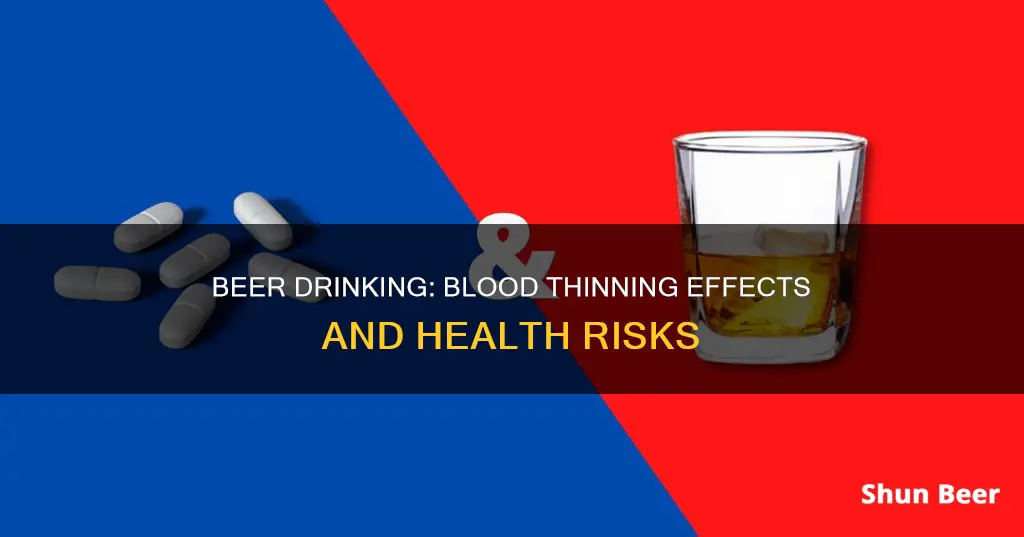
Alcohol thins the blood by reducing the number of platelets and making the existing platelets less sticky. This interferes with the blood's ability to clot, which can increase the risk of bleeding from strokes. For men, this risk increases after two drinks a day, and for women, it's one drink a day. The effects of alcohol consumption on blood pressure and heart rate can last up to 13 hours after drinking, and its effects on heart rate can last up to 24 hours. While drinking alcohol in moderation may have a protective effect on blood vessels, it is not recommended as a substitute for prescribed blood thinners due to its inconsistent effects and potential health risks.
| Characteristics | Values |
|---|---|
| Does alcohol thin the blood? | Yes |
| How does alcohol thin the blood? | Alcohol reduces the number of platelets in the blood and makes the existing platelets less sticky. |
| How long do the effects of alcohol consumption on blood pressure and heart rate last? | Up to 13 hours after drinking |
| How long do the effects of alcohol consumption on heart rate last? | Up to 24 hours after drinking |
| Is alcohol a blood thinner? | Yes, but not directly. Alcohol can interact with blood thinners. |
| What are blood thinners? | Medications that reduce blood clotting, typically prescribed to prevent dangerous blood clots that can cause heart attacks and strokes. |
| Can you drink alcohol while taking blood thinners? | It is not recommended. It can increase the risk of bleeding and other side effects. |
| What is the safe limit of alcohol consumption? | According to the American Heart Association (AHA), it is no more than two drinks per day for males and one drink per day for females. |
What You'll Learn

Alcohol prevents blood cells from clotting
Platelets are blood cells that rush to the site of an injury. They are sticky, clumping together to form a plug and stop bleeding. This process is called thrombosis. However, a blood clot can sometimes develop in, or travel to, an artery that delivers oxygen-rich blood to your heart or brain, causing a heart attack or stroke.
Alcohol has a negative influence on platelet clumping. A study at Georgetown University Medical Center found that the amount of alcohol in approximately two drinks can decrease platelet clumping. However, it is important to note that the study did not focus on how long the reduced clotting processes remained in effect, and further research is required.
Drinking more than two servings of alcohol daily increases the risk of blood clot development. This is because the body often triggers an increase in platelet development and release to counteract the effects of alcohol, leading to more potential for coagulation or clotting.
While moderate drinking may have some benefits, such as reducing the risk of strokes caused by blockages in blood vessels, the risks associated with drinking alcohol outweigh any potential health benefits. Excessive drinking increases the risk of severe health problems and can lead to internal bleeding, high blood pressure, heart failure, and stroke.
Drinking Beer at the Park: Is It Legal?
You may want to see also

Drinking alcohol can increase the risk of bleeding from strokes
Drinking alcohol can have a thinning effect on the blood. This is because alcohol prevents blood cells from sticking together and forming clots, which is the body's natural response to injuries. While this may sound beneficial, the risks associated with drinking alcohol are far more significant.
Drinking alcohol, especially in large quantities, can increase your risk of suffering a stroke caused by bleeding in the brain (a haemorrhagic stroke). This is because alcohol increases your risk of several conditions associated with strokes, including:
- Hypertension: Drinking too much alcohol increases your blood pressure, and high blood pressure is associated with over half of all strokes. Regularly drinking large amounts of alcohol can lead to damage to your circulatory system, which in turn increases your risk of stroke.
- Atrial Fibrillation: Excessive alcohol consumption can trigger this heart condition, which makes people five times more likely to experience a stroke. Atrial Fibrillation causes blood to clot in the heart, and if these clots break up or dislodge, they can travel to the brain and cause a stroke.
- Liver damage: Too much alcohol can cause damage to the liver and prevent it from producing substances that help your blood to clot. This can increase your chance of bleeding in the brain.
- Being overweight: Alcohol is very high in calories, so regularly drinking a lot can lead to weight gain or make it harder to lose weight. Being overweight increases your risk of having a stroke.
According to the National Institute on Alcohol Abuse and Alcoholism (NIAAA), moderate drinking (one or two drinks per day) lowers the risk of heart disease, ischemic stroke, and diabetes. However, consuming alcohol in high amounts is highly dangerous. Globally, excessive alcohol consumption is linked to over 1 million strokes each year.
Therefore, while drinking alcohol may thin the blood, it also increases the risk of bleeding from strokes, especially when consumed in large quantities.
Beer Consumption and Liver Enzyme Elevation: Is There a Link?
You may want to see also

Alcohol reduces the number of platelets in the blood
Alcohol can indeed thin the blood, and it does so by interfering with the clotting process. This is achieved in two ways: firstly, by reducing the number of platelets in the blood; and secondly, by making the platelets that are present less "sticky".
Platelets are the blood cells that rush to the site of an injury to form a clot and stop bleeding. They are sticky, clumping together to form a plug and close a wound. This process is called thrombosis. While this is beneficial when you are injured, sometimes a blood clot can form in or travel to an artery supplying your heart or brain with blood, causing a heart attack or stroke.
The effect of alcohol on platelets is short-lived in moderate drinkers. However, in heavy drinkers, there can be a rebound effect where the risk of bleeding increases, even after they have stopped drinking.
Beer and Fluconazole: Is It Safe to Drink?
You may want to see also

Drinking heavily can lead to high blood pressure and heart failure
Drinking alcohol can thin the blood and prevent blood cells from clotting (thrombosis). While this may reduce the risk of strokes caused by blood vessel blockages, it can also increase the risk of bleeding from strokes, especially when consumed in large quantities. For men, this means more than two drinks a day, and for women, it is more than one drink a day.
Drinking heavily can have adverse effects on the heart and lead to high blood pressure and heart failure. Firstly, alcohol raises blood pressure, especially after consuming three or more drinks in one sitting. For people with high blood pressure, drinking many days in a row or a lot in one sitting is dangerous and can even be deadly. Elevated blood pressure puts extra stress on the heart and increases the chances of experiencing cardiovascular diseases such as heart attacks, strokes, and heart failure.
Secondly, heavy drinking is linked to a number of poor health outcomes, including heart conditions. Excessive alcohol intake can lead to high blood pressure, heart failure, and stroke. It can also contribute to cardiomyopathy, a disorder that affects the heart muscle. Additionally, alcohol can lead to obesity and weight gain, further increasing the risk of heart-related problems.
Therefore, it is important to limit alcohol consumption to moderate levels and not exceed the recommended daily intake. For individuals with certain heart conditions or high blood pressure, it may be best to avoid alcohol altogether or consult with a healthcare professional.
Hopsy Beer: How Does the Freshness Work?
You may want to see also

Alcohol should not be used as a blood thinner
Firstly, alcohol is not a viable replacement for blood-thinning drugs. Blood thinners are prescribed by doctors to prevent blood clots from occurring. Drinking alcohol instead of taking medication can be dangerous.
Secondly, alcohol increases the risk of bleeding. This is because alcohol interferes with the blood's natural clotting process in two ways: by reducing the number of platelets in the blood and making the platelets that are there less "sticky". This means that drinking alcohol can increase the risk of bleeding strokes, especially when consumed in large quantities.
Thirdly, alcohol can slow down the rate at which the body breaks down and removes blood-thinning drugs, leading to a dangerous build-up of the drug in the body.
Fourthly, alcohol can increase the risk of injuries and accidents, including falls, motor vehicle accidents, and other types of accidents.
Finally, alcohol can have serious negative health effects, including an increased risk of certain cancers, birth defects, and miscarriage.
In conclusion, while alcohol may have a blood-thinning effect, it is not a safe or effective substitute for prescribed blood-thinning medication and can cause a range of dangerous side effects. It is important to follow the advice of a healthcare professional when it comes to managing blood thickness and clotting.
Legal Drinking Age: Beer and the 18-Year-Old
You may want to see also
Frequently asked questions
Yes, drinking beer can thin the blood by reducing the ability of blood cells to clot.
Alcohol reduces the number of platelets in the blood and makes the existing platelets less sticky, which makes it harder for blood clots to form.
The effects of alcohol on blood pressure and heart rate can last up to 13 hours after drinking, and its effects on heart rate can last up to 24 hours.
It is not recommended to drink alcohol while taking blood thinners as it can increase the risk of bleeding. However, some studies suggest that low to moderate consumption may be safe. It is important to consult a doctor before consuming alcohol while on blood thinners.
No, alcohol should not be used as a substitute for prescribed blood thinners as its effects are inconsistent and can vary based on individual factors.







